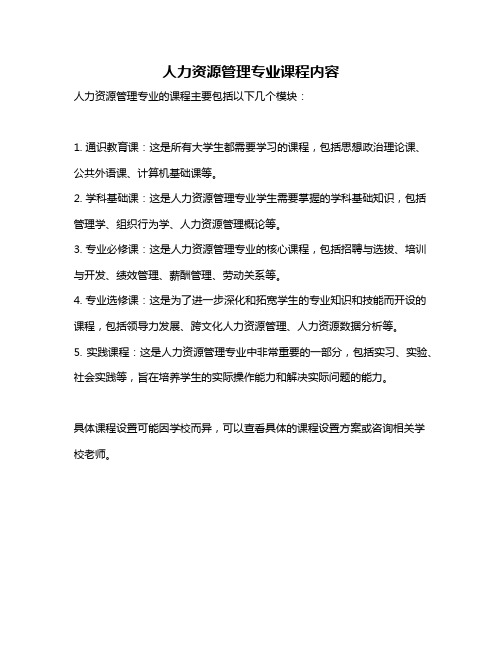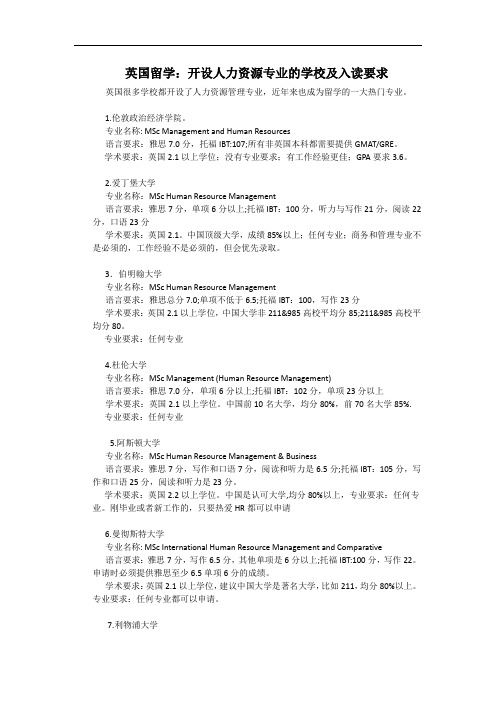英国人力资源管理专业课程设置
人力资源管理专业课程内容

人力资源管理专业课程内容
人力资源管理专业的课程主要包括以下几个模块:
1. 通识教育课:这是所有大学生都需要学习的课程,包括思想政治理论课、公共外语课、计算机基础课等。
2. 学科基础课:这是人力资源管理专业学生需要掌握的学科基础知识,包括管理学、组织行为学、人力资源管理概论等。
3. 专业必修课:这是人力资源管理专业的核心课程,包括招聘与选拔、培训与开发、绩效管理、薪酬管理、劳动关系等。
4. 专业选修课:这是为了进一步深化和拓宽学生的专业知识和技能而开设的课程,包括领导力发展、跨文化人力资源管理、人力资源数据分析等。
5. 实践课程:这是人力资源管理专业中非常重要的一部分,包括实习、实验、社会实践等,旨在培养学生的实际操作能力和解决实际问题的能力。
具体课程设置可能因学校而异,可以查看具体的课程设置方案或咨询相关学校老师。
人力资源管理专业有哪些课程

人力资源管理专业有哪些课程
人力资源(Human Resource ,简称HR)指在一个国家或地区中,处于劳动年龄、未到劳动年龄和超过劳动年龄但具有劳动能力的人口之和。
或者表述为:一个国家或地区的总人口中减去丧失劳动能力的人口之后的人口。
人力资源也指一定时期内组织中的人所拥有的能够被企业所用,且对价值创造起贡献作用的教育、能力、技能、经验、体力等的总称。
主干学科
西方经济学、统计学、组织行为学、管理学、会计学、薪酬管理、工作分析与评价、福利管理、劳动关系、战略管理、绩效管理、培训与开发、雇员流动管理、国际人力资源管理、人力资源规划等。
主要课程
《管理学》、《微观经济学》、《宏观经济学》、《管理信息系统》,《统计学》、会计学、财务管理、市场营销、经济法、人力资源管理、组织行为学、劳动经济学、绩效管理、薪酬与福利、培训与开发、招聘与配置、人力资源规划、劳动法、人力资源管理软件、专业英语。
主要实践性教学环节:包括课程实习与毕业实习,一般安排10-12周。
修业年限
三年
大学专科(无学位)
四年
授予学位
管理学学士(荣誉生)
学科
管理学 (Management)
门类
工商管理 ( Business Administration)
专业名称
人力资源管理 (Human Resources Management)
想要了解更多的课程信息请登录际通宝中国企业培训网了解。
英国牛津大学人力资源管理专业的申请条件.doc

英国牛津大学人力资源管理专业的申请条
件
学校名称:
英国牛津大学
University
of
Oxford
所在位置:英国
QS排名:5
True牛津大学(OX)
课程名称:劳资关系及人力资源管理硕士(MSc
Industrial
Relations
and
Human
Resource
Management)
简介:这是牛津大学新开的一个介与授课型与研究型之间的研究生课程。
牛大这样的学校非常注重基础学科和研究,这个课程虽然被牛大列为研究生型硕士(Research
Degree),但入学要求和学习方式和授课型非常类似。
课程主要强调不同国家工作关系理论系统的比较。
申请条件:学士学位(4分计算方法下,绩点在 3.5以上);GMAT或者每部分在600分以上的GRE成绩;IELTS达到7.5
学习期限:1年(全职)
英国大学学费:10000英镑左右,另外,学院还要收取1700-2000英镑的学院学费。
为什么都说英国管理学专业实用性强

为什么都说英国管理学专业实用性强(1)要求非商科背景比如St. Andrews University的MLitt Management要求申请者是无商科专业背景,可以是学工程、中文或英语等专业的本科毕业生。
这种情况下,国内读管理的学生只能选择国际商务、金融、市场营销、人力资源等细分专业,而不能选择general的管理课程。
特别说一下国内的国际经济与贸易专业,虽然最终发经济学学位,但是一般来说国际贸易类的课程或一般管理类课程比较多,因此属于商科背景,所以一般也不能申请这类选择general的管理课程。
(2)另一种是没有专业限制也就是什么专业申请都可以。
比如约克大学的MA in Management 的要求为:a good first degree (2:1 or equivalent) in any subject. Please note that preference may be given to students with some prior study of business management. 申请者可以是任何专业的,但是之前最好学习过一些商科课程。
对于很多学生来说,“管理学”乍一看,显得十分枯燥,给人的印象平凡,学习的内容泛泛,将来的就业前景模糊不明确。
而事实上如果您经过了解其实并非如此,英国管理学专业设置十分细分化,种类多,学生可以根据自己的喜好以及将来的就业规划而定相应的管理学专业。
英国大学管理学都包括哪些细分专业?管理学不是单纯的管理,有很多方向与细分,其实它是五花八门丰富多彩的。
与管理相关的专业有:Msc Management 管理学Msc Human Resource Management 人力资源管理Msc Marketing Management 营销管理Msc Tourism Mangement 旅游管理Msc Event Mangement 大型活动管理Msc Hotel Mangement 酒店管理Msc Finance an Management 金融与管理Msc International Management 国际管理Msc International Mangement and Entrepreneurship 国际性管理与企业Msc Management(Creative and Cultural Industries)创意文化产业管理Msc Sports Management 体育管理Msc Service and Marketing 服务与市场营销MSc International Business 国际商务MSc International Business and Corporate Governance 国际商务与政府合作MSc International Business and Finance 国际商务与金融MSc International Business and Marketing 国际商务与市场营销MSc International Business and Human Resource Management 国际商务与人力资源管理MSc International Business, Marketing and Human Resource Management 国际商务,市场营销与金融管理有哪些英国管理学专业大学推荐以及其相关要求:1. 针对于管理专业Msc/Ma Management:必须是非商科专业背景的:Bath, Leeds, St Andrews, Warwick可转专业:York, Surrey, Southampton, Leicester,Sheffield, Loughborough, Liverpool, Lancaster, Kent; Edinburgh; Bristol相关专业背景:Brunel, Essex(最好是有工作经验),Glasgow, Stirling2. 针对于国际管理专业Msc/Ma International Management有此专业的学校有:Bath, Birmingham, Essex, Exeter, KCL, Loughborough, Oxford Brookes, Royal Holloway, Sheffield, Sussex其中接受转专业学生的:Exeter, Loughborough, Oxford Brookes, Royal Holloway, Sussex要求IELTS7.0的学校:KCL(各项不低于7), Bath, Sheffield3 针对于人力资源管理专业的院校MA/Msc Human Resource Management:Birmingham, Bournemouth, Cardiff, Glasgow, HW, KCL, Kent, Lancaster, Leeds, Liverpool, Manchester, Newcastle, Nothumbria, Nottingham Trent, Oxford Brookes, Queen Mary, Royal Holloway, Sheffield, Southampton, Stirling, Surrey, UEA, York,Aberdeen, Aston,接受转专业的学校: Aberdeen, Birmingham, Bournemouth, HW, Kent, Liverpool, Manchester, Newcastle, UEA, Stirling要求IELTS7的学校:Aston, KCL, Lancaster, Manchester, Queen Mary, Sheffield要求IELTS6的学校:Stirling, Bournemouth4 针对于Msc Marketing Management营销管理专业:Aston, Coventry, Essex, KCL, Kent, Lancaster, Leeds, Loughborough, Southampton, Surrey接受转专业学生的:Aston, Essex, Kent, Leeds(Msc International Marketing Management不接受Marketing本专业的学生),Loughborough5 针对于金融和管理专业Msc/Ma Finance and ManagementYork,Aberdeen, Bristol, Exeter, Lancaster, Leicester, Reading, Southampton, St Andrews, Surrey, UEA接受转专业学生:Aberdeen, Kent(非金融背景),Loughborough, Queen Mary, UEA要求IELTS7.0的学校:Aberdeen, Bristol, Lancaster, Queen Mary如何选择各英国大学管理学,有什么建议?大多数学生在选择学校时会比较看重学校的排名或是专业的排名,而忽略的课程设置。
英国留学:开设人力资源专业的学校及入读要求

英国留学:开设人力资源专业的学校及入读要求英国很多学校都开设了人力资源管理专业,近年来也成为留学的一大热门专业。
1.伦敦政治经济学院。
专业名称: MSc Management and Human Resources语言要求:雅思7.0分,托福IBT:107;所有非英国本科都需要提供GMAT/GRE。
学术要求:英国2.1以上学位;没有专业要求;有工作经验更佳;GPA要求3.6。
2.爱丁堡大学专业名称:MSc Human Resource Management语言要求:雅思7分,单项6分以上;托福IBT:100分,听力与写作21分,阅读22分,口语23分学术要求:英国2.1。
中国顶级大学,成绩85%以上;任何专业;商务和管理专业不是必须的,工作经验不是必须的,但会优先录取。
3.伯明翰大学专业名称:MSc Human Resource Management语言要求:雅思总分7.0;单项不低于6.5;托福IBT:100,写作23分学术要求:英国2.1以上学位,中国大学非211&985高校平均分85;211&985高校平均分80。
专业要求:任何专业4.杜伦大学专业名称:MSc Management (Human Resource Management)语言要求:雅思7.0分,单项6分以上;托福IBT:102分,单项23分以上学术要求:英国2.1以上学位。
中国前10名大学,均分80%,前70名大学85%.专业要求:任何专业5.阿斯顿大学专业名称:MSc Human Resource Management & Business语言要求:雅思7分,写作和口语7分,阅读和听力是6.5分;托福IBT:105分,写作和口语25分,阅读和听力是23分。
学术要求:英国2.2以上学位。
中国是认可大学,均分80%以上,专业要求:任何专业。
刚毕业或者新工作的,只要热爱HR都可以申请6.曼彻斯特大学专业名称: MSc International Human Resource Management and Comparative语言要求:雅思7分,写作6.5分,其他单项是6分以上;托福IBT:100分,写作22。
人力资源专业课程设置

人力资源专业课程设置
在现代社会中,人力资源管理已经成为了企业管理中不可或缺的一部分。
因此,越来越多的高校开始设立人力资源专业,培养具备人力资源管理知识和技能的专业人才。
那么,人力资源专业的课程设置应该如何设计呢?
首先,人力资源专业的核心课程应该包括人力资源管理基础、组织行为学、薪酬管理、招聘与培训等方面的课程。
这些课程可以帮助学生了解企业内部管理的基本原理和方法,以及如何促进员工的工作积极性和生产力。
其次,人力资源专业还应该注重培养学生的实践能力。
比如,可以开设实习课程,让学生到企业中实践管理技能,了解企业的实际运营情况,提高自己的实践能力和应变能力。
此外,还可以开设一些选修课程,让学生能够深入学习人力资源管理的各个方面。
比如,可以开设劳动法律、职业道德、绩效考核等课程,让学生全面了解人力资源管理的实践操作和法律法规知识。
总之,人力资源专业的课程设置应该既注重专业知识的学习,又要注重学生的实践能力和综合素质的提升。
只有这样,才能培养出具有竞争力的人力资源管理人才。
- 1 -。
人力资源管理(英语)-教学大纲

Human Resource ManagementCourse Code:050232BCourse Name:Human Resource ManagementPeriods:32Credits:2Name(s) of academic staff:Wei Hua-yingPreparatory Courses:Learning outcomes(1)Define the roles and activities of a company's human resource managementfunction.(2)Discuss how to strategically plan for the human resources needed to meetorganizational goals and objectives.(3)Define the process of job analysis and discuss its importance as a foundationfor human resource management practice.(4)Compare and contrast methods used for selection and placement of humanresources.(5)Describe the steps required to analyze, develop, implement, and evaluate anemployee training program.(6)Identify and explain the issues involved in establishing compensationsystems.(7)Identify how new technology, such as digital and social media, is influencinghuman resource management.(8)Discuss what companies should do to compete in the global marketplace.(9)Identify the importance of the process of human resource managementfunctions in small businesses and entrepreneurial firms.Course DescriptionThis course is an introduction to the human resource management (HRM) function and related elements and activities to examine the role of the human resource professional as a strategic partner in managing today’s organizations. Key functions such as recruitment, selection, development, performance management, appraisal, retention, compensation, and labor relations are examined. Implications of the legal and global environments are examined and current issues such as employee engagement and employee health and safety are analyzed. Emphasis is placed on the modern day importance of HRM at the corporate level as well as the importance ofHRM in small businesses and entrepreneurial firms.●Mode of deliveryLecture and Tutorial.●Content outline of the subject and learning time per topicLecture OutlineChapter 1 Introduction to Human Resource Management (1)What Is Human Resource Management?(2)The Trends Shaping Human Resource Management (3)Today’s New Human Resource Management(4)The New Human Resource Manager(5)The Plan of This Book(6)Chapter Contents Overview(7)The Topics Are InterrelatedChapter 2 Equal Opportunity and the Law(1)Equal Opportunity Laws Enacted From 1964 to 1991(2)The Laws Enacted from 1991 to the Present(3)Defenses Against Discrimination Allegations(4)The EEOC Enforcement Process(5)Diversity ManagementChapter 3 Human Resource Management Strategy and Analysis(1)The Strategic Management Process(2)Types of Strategies(3)Strategic Human Resource Management(4)HR Metrics, and Benchmarking, and Data Analytics(5)High-Performance Work Systems(6)Employee Engagement Guide for Managers: Employee Engagement and Performance.Chapter 4Job Analysis and the Talent Management Process(1)The Talent Management Process(2)The Basics of Job Analysis(3)Methods for Collecting Job Analysis Information(4)Writing Job Descriptions(5)Writing Job Specifications(6)Employee Engagement Guide for Managers(7)Using Competencies ModelsChapter 5 Personnel Planning and Recruiting(1)Workforce Planning and Forecasting(2)Why Effective Recruiting Is Important(3)Internal Sources of Candidates(4)Employee Engagement Guide for Managers(5)Outside Sources of Candidates(6)Recruiting a More Diverse Workforce(7)Developing and Using Application FormsChapter 6Employee Testing and Selection(1)Why Employee Selection Is Important(2)The Basics of Testing and Selecting Employees(3)Types of Tests(4)Work Samples and Simulations(5)Background Investigations and Other Selection MethodsChapter 7Interviewing Candidates(1)Basic Types of Interviews(2)Avoiding Errors That Can Undermine an Interview’s Usefulness (3)How to Design and Conduct the Effective Interview(4)Employee Engagement Guide for Managers(5)Developing and Extending the Job OfferChapter 8Training and Developing Employees(1)Orienting and Onboarding New Employees(2)Employee Engagement Guide for Managers: Onboarding at Toyota (3)Overview of the Training Process(4)Implementing the Training Program(5)Implementing Management Development Programs(6)Managing Organizational Change Programs(7)Evaluating the Training EffortChapter 9Performance Management and Appraisal(1)Basics of Performance Appraisal(2)Techniques for Appraising Performance(3)Dealing with Rater Error Appraisal Problems(4)Managing the Appraisal Interview(5)Employee Engagement Guide for Managers(6)Performance ManagementChapter 10Managing Careers and Retention(1)Career Management(2)Employee Engagement Guide for Managers(3)Managing Employee Turnover and Retention(4)Employee Life-Cycle Career Management(5)Managing DismissalsChapter 11Establishing Strategic Pay Plans(1)Basic Factors in Determining Pay Rates(2)Job Evaluation Methods(3)How to Create A Market-Competitive Pay Plan(4)Pricing Managerial and Professional Jobs(5)Contemporary Topics in Compensation(6)Employee Engagement Guide For ManagersChapter 12Pay for Performance and Financial Incentives(1)Money’s Role in Motivation(2)Individual Employee Incentive and Recognition Programs(3)Incentives for Salespeople(4)Incentives for Managers and Executives(5)Team and Organization-Wide Incentive Plans(6)Employee Engagement Guide for ManagersChapter 13Benefits and Services(1)Introduction: The Benefits Picture Today(2)Pay for Time Not Worked(3)Insurance Benefits(4)Retirement Benefits(5)Personal Services and Family-Friendly Benefits(6)Flexible Benefits Programs(7)Employee Engagement Guide For ManagersChapter 14Building Positive Employee Relations(1)What is Employee Relations?(2)Employee Relations Programs For Bu ilding And Maintaining Positive Employee Relations(3)The Ethical Organization(4)Managing Employee Discipline(5)Employee Engagement Guide For ManagersChapter 15Labor Relations and Collective Bargaining(1)The Labor Movement(2)Unions And The Law(3)The Union Drive and Election(4)The Collective Bargaining Process(5)Dealing With Disputes And Grievances(6)The Union Movement Today And TomorrowChapter 16Safety, Health, and Risk Management(1)Introduction: Safety and the Manager(2)Manger’s Briefing on Occupational Safety Law(3)What Causes Accidents?(4)How to Prevent Accidents(5)Employee Engagement Guide for Managers(6)Workplace Health Hazards: Problems and Remedies(7)Occupational Security and Risk ManagementChapter 17Managing Global Human Resources(1)The Manager’s Global Challenge(2)Adapting Human Resource Activities to Intercountry Differences (3)Staffing the Global Organization(4)Training and Maintaining Employees Abroad(5)Employee Engagement Guide for Managers(6)Managing HR Locally: How to Put into Practice a Global HR SystemChapter 18Managing Human Resources in Small and Entrepreneurial Firms (1)The Small Business Challenge(2)Using Internet and Government Tools to Support the HR Effort(3)Leveraging Small Size with Familiarity, Flexibility, Fairness and Informality(4)Using Professional Employer Organizations(5)Managing HR Systems, Procedures, and Paperwork●Assessment:Final Examination 60%; Attendance 20%; Group Assignment 20%.●ReferencesMain references:Gary Dessler (2016) Human Resource Management, 15th Edition, London: Pearson。
英国美国人力资源专业研究报告非常详细版

人力资源管理专业人力资源的渊源:“人力资源”这一概念早在1954年就由彼德·德鲁克在其著作《管理的实践》提出并加以明确界定。
20世纪80年代以来,人力资源管理理论不断成熟,并在实践中得到进一步发展,为企业所广泛接受,并逐渐取代人事管理。
进入20世纪90年代,人力资源管理理论不断发展,也不断成熟。
人们更多的探讨人力资源管理如何为企业的战略服务,人力资源部门的角色如何向企业管理的战略合作伙伴关系转变。
战略人力资源管理理论的提出和发展,标志着现代人力资源管理的新阶段。
现代人力资源管理,深受经济竞争环境、技术发展环境和国家法律及政府政策的影响。
它作为近20年来出现的一个崭新的和重要的管理学领域,远远超出了传统人事管理的范畴。
现代人力资源管理以“人”为核心,强调一种动态的、心理、意识的调节和开发,管理的根本出发点是“着眼于人”,其管理归结于人与事的系统优化,致使企业取得最佳的社会和经济效益,并提倡“只有真正解放了被管理者,才能最终解放管理者自己”的思想,将这一思想贯彻到实际工作中,实现人力资源管理职能的各组织中的人事部门逐渐成为决策部门的重要伙伴,从而提高了人事部门在决策中的地位。
人力资源专业的就业前景:人力资源是当前热门学科之一,而我们现在所说的人力资源并不是过去简单的人事工作,如今招聘、培训、考核、企业文化等等都是其涵盖的内容。
由于人力资源相关理论引入国内的时间并不长,企业对现代人力资源管理制度的认识有一个逐渐接受的过程;人力资源管理作为一门实用学科,很多企业在招聘时都是需要有一定工作经验的。
据调查,人力资源管理专业学生就职企业分布于金融保险业;信息产业;咨询服务业;快速消费品;电子技术;制药与生物工程;耐用消费品(轻工、家电、服装、纺织)。
可见招聘企业主要集中于金融保险业、咨询服务业、快速消费品行业等热门和具发展潜力的行业。
中外人力资源的观念:中国现代的人力资源管理基本都是纯“进口”的,中国企业在引进了所谓西方的先进管理时,大部分都是囫囵吞枣,没有经过消化就直接运用,结果许多企业都患上了人力资源管理方面的病。
- 1、下载文档前请自行甄别文档内容的完整性,平台不提供额外的编辑、内容补充、找答案等附加服务。
- 2、"仅部分预览"的文档,不可在线预览部分如存在完整性等问题,可反馈申请退款(可完整预览的文档不适用该条件!)。
- 3、如文档侵犯您的权益,请联系客服反馈,我们会尽快为您处理(人工客服工作时间:9:00-18:30)。
官方网站:/
英国人力资源管理专业课程设置
在现代企业和经济发展中,人才是一种无法估量的资本,一种能给企业带来巨大效益的资本。
而人力资源管理则是企业发展的动力源泉,是企业可持续发展的根本保障。
如果对海外留学有疑问,可以在线咨询小马过河留学专家,也可拨打全国免费咨询电话:4008-123-267!
人力资源部门根据企业的发展现状和未来的发展方向,有计划、有目标地开展工作,对管理人员、企业员工提出具体工作要求。
通过加强企业文化建设和提高员工素质来实现有效的人力资源管理。
因此,做好人力资源的管理工作对企业的发展和利益都是着不可或缺的重要作用。
英国人力资源管理专业课程设置必修课:
Human Resource Management:
Strategy and Practice (人力资源管理:战略和实践)
Industrial Relations(劳资关系)
Multinationals and Comparative Employment Systems (跨国公司和比较就业系统)
Research Methods for Organisations(组织研究方法)
Leadership and Management Development(领导力和管理发展)
Resourcing and Talent Management(资源和人才管理)
Human Resources in Management Context(人力资源管理环境)
Organisational Behaviour(组织行为)
英国人力资源管理专业课程设置选修课:
Corporate Governance(公司治理)
Employee Development and Workplace Learning(员工发展和学习)
Managing Diversity(管理多样性)
Leading, Managing and Developing People(领导,管理和发展的人)
International and Comparative Human Resource Management(国际人力资源管理和比较)。
